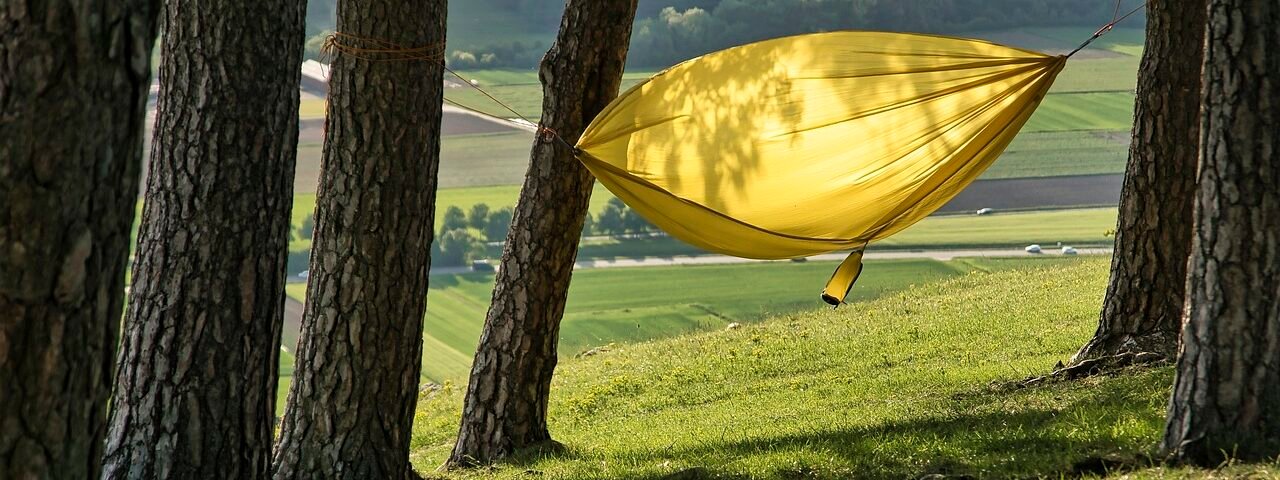I’m sitting on my deck in Alaska, taking in the view and basking in the sunshine while I sip my coffee. But I can’t shake the guilt. That gnawing feeling that I should be “doing something”. I haven’t done a single productive thing all day. Time is ticking away. I see the paint peeling on the house trim. The lawn needs to be mowed. The deck needs to be sanded down and refinished. The flowerbeds all need weeding. And winter is coming.
It was my number one priority this summer. Get things done around the house and yard. Now it’s almost fall. As I sit contemplating my long list of chores I should do but haven’t, two dragonflies sail past. They dip and dive, float up, playing with each other. I watch as they flutter by, sparkling in the afternoon sun. It reminds me of my favorite poem:
James Wright’s Lying in a Hammock at William Duffy’s Farm in Pine Island, Minnesota
Over my head, I see the bronze butterfly,
Asleep on the black trunk,
Blowing like a leaf in green shadow.
Down the ravine behind the empty house,
The cowbells follow one another
Into the distances of the afternoon.
To my right,
In a field of sunlight between two pines,
The droppings of last year’s horses
Blaze up into golden stones.
I lean back, as the evening darkens and comes on.
A chicken hawk floats over, looking for home.
I have wasted my life.
It’s the last line. That’s the one that makes you think. How has he wasted his life? What is a well-lived life? The poem captures the peaceful reflection of a summer day. The beauty of the moment. Is the author expressing a regret for not having lived more fully or actively? Or is he recognizing the guilt of being “lazy”? Is it a haunting realization of a life seemingly unfulfilled?
Awe, but let’s step back and question this idea. Do we really need to be productive all the time? Why do we put so much pressure on ourselves to stay busy? Perhaps it’s because we live in a society that celebrates busyness as a virtue. We glorify the hustle, the grind, the endless to-do lists. We wear our stress like a badge of honor, a sign that we’re important, that we’re doing something that matters.
Yet, the truth is, being busy all the time doesn’t necessarily equate to a meaningful life. In fact, it can often be the opposite. When we’re constantly rushing from one task to the next, we miss out on the moments that give life its richness. We forget to pause and appreciate the world around us—the feel of the sun on our skin, the sound of leaves rustling in the breeze, the simple joy of a good book or a leisurely conversation with a friend.
The Irony of Lying in a Hammock
Maybe the last line of the poem is irony. A reminder that moments in a hammock, taking in the world are not wasted. For me, it has always read as a critique of our tendency to undervalue moments of stillness and reflection. In a world that equates productivity with worth, the idea of lying in a hammock and doing nothing can seem like a waste. But the poem challenges this notion by presenting a moment of profound beauty that arises precisely because we are doing nothing. The bronze butterfly, the cowbells, the chicken hawk – all these details might have gone unnoticed had the author been preoccupied with more “productive” activities.
So, does the last line mean that you should spend more time lying in a hammock? Perhaps. But not necessarily in the literal sense. Maybe the hammock symbolizes a state of mind—one that is open to the world, receptive to beauty, and unburdened by the need to constantly be doing something. A reminder to stay in the moment. Stop and smell those proverbial roses. The poem invites us to consider the possibility that a life well-lived is not measured solely by our achievements or productivity, but by our capacity to appreciate the world’s quiet moments.
Retirement is a chance to reclaim those moments. It’s a time to let go of the need to constantly be doing and start simply being. It’s okay to relax, to lie in a hammock, to take time to enjoy life without feeling like you’re wasting it. In fact, those moments of rest and reflection can be some of the most valuable of all. They give us space to breathe, to think, to connect with ourselves and the world around us.
Maybe, just maybe, it’s okay to lie in a hammock, watch the world go by, and know that in those quiet moments, you are exactly where you need to be. Life isn’t just about how much you do—it’s about how much you live.


